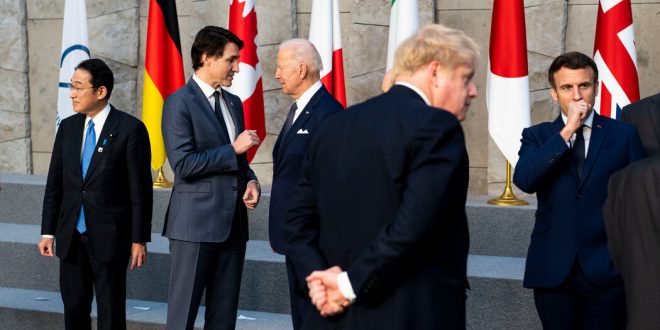Good morning. We’re covering global summits about Ukraine, a North Korean missile test and a change in Australia’s refugee policy.
North Korea tests an ICBM
North Korea carried out its boldest weapons test in years and its first intercontinental ballistic missile firing since 2017. The missile on Thursday appeared to be the North’s most powerful ICBM to date, South Korean officials said.
Coming just before a NATO meeting over the war in Ukraine, the test drastically escalated tensions with the Biden administration. The U.S., Japan and South Korea quickly condemned the launch, which spurred tit-for-tat missile launches by South Korea.
Launch: The missile flew at an extremely steep angle, reaching an altitude of 6,000 kilometers — far higher than in past tests — and covering 1,099 kilometers before it crashed into waters west of Japan 71 minutes after liftoff, Japanese officials said. Questions remain about whether the North could hit another continent.
Background: Here’s a look inside the country’s arsenal.
Politics: The test comes less than three weeks after the South elected a president who promised a tougher stance on the North.
New Zealand resettles offshore refugees
After refusing for years, Australia will allow some refugees currently or previously held in its widely criticized offshore detention centers to resettle in New Zealand.
Australia’s government has long suggested that the arrangement could encourage more people to make dangerous sea crossings to try to eventually enter Australia — perhaps through New Zealand, where all refugees are put on a path to citizenship.
It was not immediately clear why Australia changed its mind. One refugee coordinator suggested that the length and cost of the detentions had become burdensome.
Background: New Zealand first offered the arrangement in 2013, after Australia began holding those arriving by boat on islands, pledging to prevent them from ever settling in the country.
Details: New Zealand will take in 150 refugees a year for three years, as part of its total annual refugee quota of 1,500 people.
Centers: Australia has detained more than 3,000 refugees and asylum seekers on Manus Island in Papua New Guinea and Nauru, a Pacific island nation, where about 112 people remain. Human rights groups have deemed the detentions a violation of international law, citing the cruel conditions in which the refugees live.
THE LATEST NEWS
Asia and the Pacific
Along a lonely stretch of what was once the most dangerous road in Afghanistan, everyone slows down when they reach Hafiz Qadim’s mud-brick shop. It’s not the food. Or the gas. It’s the bomb crater in the middle of the road, which makes for a convenient pit stop.
Russia-Ukraine War: Key Developments
ARTS AND IDEAS
A film for boy band fans
“Turning Red,” Pixar’s latest coming-of-age film, follows Meilin Lee, a Chinese Canadian teenager who transforms into a giant red panda whenever she feels an intense emotion — a metaphor for the growing pains of puberty.
The red panda signifies Mei’s journey from a dutiful daughter of Asian immigrants to a young woman bursting with messy feelings and challenging her family’s expectations. The biggest trigger of Mei’s panda, to her mother’s dismay, is her passion for 4*Town, a boy band that resembles *NSYNC and BTS. “It’s a side of teen girls that you never get to see,” the film’s director, Domee Shi, told The Times. “We are just as awkward and sweaty and lusty and excited as any boy.”
Former and current boy-band fans will see themselves in scenes like the one in which Mei introduces each 4*Town member with a specific fact (“Tae Young fosters injured doves!”) or when Mei and her friends record videos of themselves dancing to the band’s hits (including “Nobody Like U,” written by Billie Eilish and Finneas).
With her friends’ help, Mei learns to control her red panda, even harnessing it to raise money to see 4*Town perform. They will walk into that concert as girls, Mei says, and come out as women.
— Ashley Wu, graphics editor
PLAY, WATCH, EAT
What to Cook
That’s it for today’s briefing. See you next time. — Amelia
P.S. David Wallace-Wells will be joining The Times Magazine and Times Opinion, where he will write a weekly newsletter covering climate change, technology and the future of the planet.
The latest episode of “The Daily” is on Russia’s approach in Ukraine.
You can reach Amelia and the team at briefing@nytimes.com.
 Top Naija News: Nigerian News, Breaking News Nigeria and World News Top Naija News is a daily news publication in Nigeria, delivering the latest breaking news in Nigeria and around the world.
Top Naija News: Nigerian News, Breaking News Nigeria and World News Top Naija News is a daily news publication in Nigeria, delivering the latest breaking news in Nigeria and around the world.




